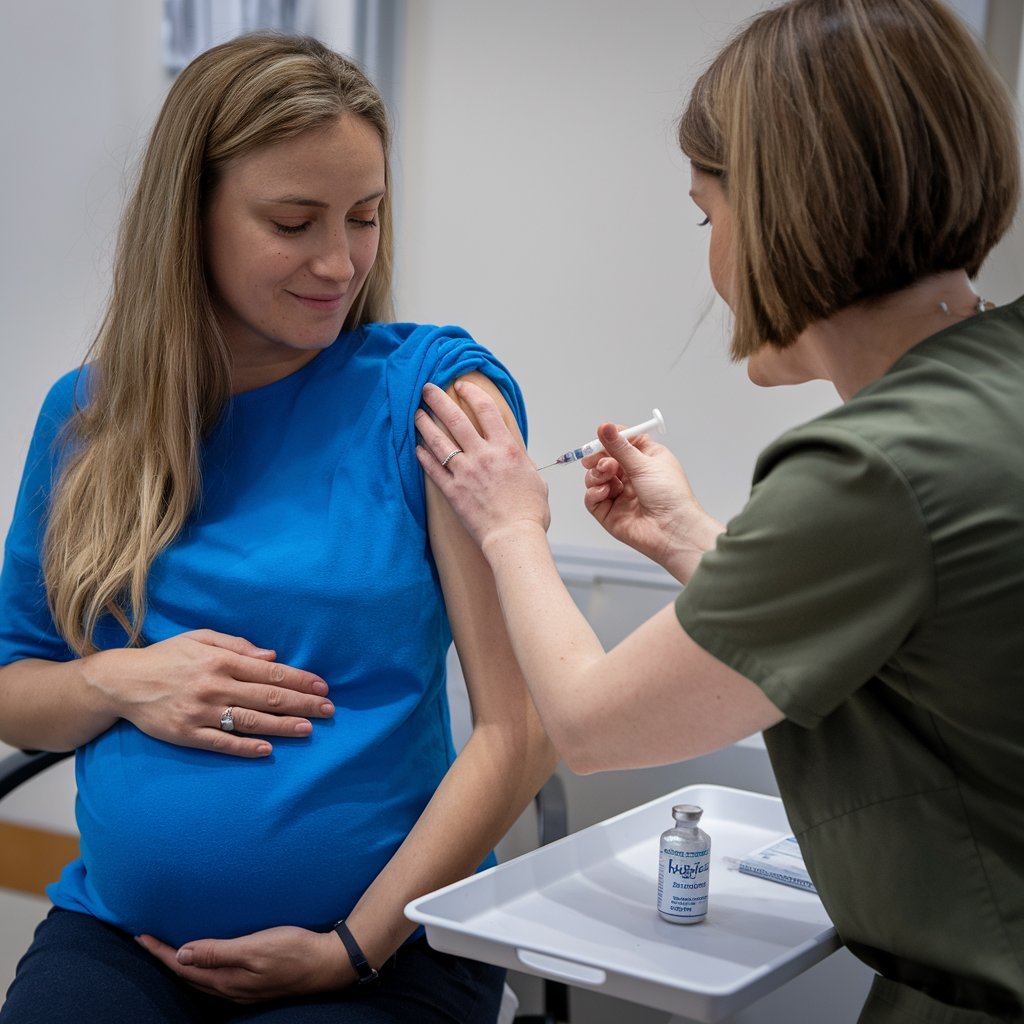Introduction
Pregnancy is a time of immense joy, anticipation, and careful planning. But amidst the excitement, many expecting mothers wonder: How can I best protect myself and my baby during this critical period? One of the most powerful tools available is vaccines. Vaccines during pregnancy not only safeguard the health of the mother but also provide crucial immunization to the newborn during those vulnerable early months. Yet, questions about safety, timing, and effectiveness often arise. Are vaccines truly safe for pregnant women? Which ones are recommended, and why?
In this blog, we’ll explore the importance of vaccines during pregnancy, address common concerns, and provide evidence-based insights to help you make informed decisions. Whether you’re a first-time mom or adding to your family, understanding the role of vaccines can empower you to take proactive steps for a healthier pregnancy and a stronger start for your little one. Let’s dive in!
Table of Contents
Vaccines During Pregnancy
Why Vaccines During Pregnancy Are Important
Pregnancy is a time when your body works tirelessly to nurture and protect your growing baby. But did you know that getting vaccinated during pregnancy can be one of the most effective ways to safeguard both you and your little one? Vaccines during pregnancy play a dual role: they shield you from serious illnesses while also passing on vital immunity to your baby during those first few months of life when they’re too young to be vaccinated themselves.

Here’s why vaccines are so crucial during this special time:
- Protecting Both Mother and Baby: When you get vaccinated, you’re not just protecting yourself—you’re also giving your baby a head start in building their immune system. For example, the whooping cough vaccine (Tdap) helps prevent a potentially life-threatening infection in newborns, who are especially vulnerable.
- Reducing Risks of Serious Complications: Pregnant women are more susceptible to severe outcomes from illnesses like the flu or COVID-19. Vaccines significantly lower the risk of hospitalization, preterm birth, and other complications that can arise from these infections.
- Building Immunity for the Newborn: Babies are born with some immunity passed from their mothers, but this protection is temporary. Vaccines like Tdap and the flu shot boost this natural immunity, offering your baby a stronger defense during their most vulnerable stage.
You might be wondering, Are vaccines during pregnancy safe? The answer is a resounding yes. Decades of research and real-world data have shown that vaccines like the flu shot and Tdap are not only safe but highly effective for pregnant women and their babies. In fact, organizations like the CDC and WHO strongly recommend them as a critical part of prenatal care.
By choosing to get vaccinated, you’re taking a proactive step toward a healthier pregnancy and a safer start for your baby. It’s a simple yet powerful way to ensure that both of you are protected during this incredible journey.
So, why wait? Let’s explore which vaccines are recommended and how they can make a difference for you and your little one.
Recommended Vaccines During Pregnancy
When it comes to vaccines during pregnancy, knowing which ones are recommended—and why—can make all the difference for you and your baby. The good news? You don’t have to navigate this alone. Healthcare providers and leading health organizations have clear guidelines to help you make informed decisions. Let’s break down the key vaccines that are not only safe but highly beneficial during pregnancy.
1. Flu Vaccine: Timing and Benefits
The flu might seem like a common illness, but for pregnant women, it can lead to serious complications like pneumonia or preterm labor. That’s why the flu vaccine is a must during pregnancy. Here’s what you need to know:
- When to Get It: The flu shot is recommended during any trimester of pregnancy, ideally before flu season peaks.
- Why It’s Important: It reduces the risk of severe illness for you and protects your baby from the flu during their first few months of life.
2. Tdap Vaccine: Preventing Whooping Cough
Whooping cough (pertussis) can be life-threatening for newborns, and the Tdap vaccine is your best defense.
- When to Get It: The ideal time is between 27 and 36 weeks of pregnancy, as this allows maximum immunity to pass to your baby.
- Why It’s Important: It protects your baby from whooping cough until they’re old enough to receive their own vaccinations.
3. COVID-19 Vaccine: Safety and Efficacy
The COVID-19 pandemic has highlighted the importance of vaccination, especially for pregnant women who are at higher risk of severe outcomes.
- When to Get It: You can receive the COVID-19 vaccine at any point during pregnancy or while breastfeeding.
- Why It’s Important: It significantly lowers the risk of severe illness, hospitalization, and complications for both you and your baby.
4. Other Vaccines to Consider Based on Individual Needs
Depending on your health history, travel plans, or specific risks, your healthcare provider might recommend additional vaccines, such as:
- Hepatitis B: If you’re at risk of contracting hepatitis B, this vaccine can protect you and prevent transmission to your baby.
- RSV Vaccine: Recently approved for pregnant women, this vaccine helps protect newborns from respiratory syncytial virus (RSV), a common cause of severe respiratory infections in infants.
By staying up-to-date on these recommended vaccines during pregnancy, you’re taking a powerful step toward protecting yourself and your little one. Ready to learn more about how these vaccines work and when to get them? Let’s keep going!
Safety and Effectiveness of Vaccines During Pregnancy
When it comes to vaccines during pregnancy, it’s natural to have questions. Are they really safe? How do they work to protect me and my baby? Rest assured, the vaccines recommended for pregnant women have been thoroughly studied and are proven to be both safe and effective. Let’s dive into the science and facts to put your mind at ease.

1. Research-Backed Evidence on Vaccine Safety
Vaccines like the flu shot, Tdap, and COVID-19 vaccine have been extensively studied in pregnant women. Here’s what the research shows:
- Flu Vaccine: Studies involving thousands of pregnant women have confirmed that the flu shot is safe during any trimester and does not increase the risk of complications.
- Tdap Vaccine: Research shows that the Tdap vaccine is not only safe but also highly effective in preventing whooping cough in newborns.
- COVID-19 Vaccine: Data from millions of vaccinated pregnant women worldwide have demonstrated that the COVID-19 vaccine does not increase the risk of miscarriage, preterm birth, or other adverse outcomes.
2. Addressing Common Concerns and Myths
It’s easy to feel overwhelmed by misinformation, so let’s clear up some common myths:
- Myth: Vaccines can harm my baby.
Fact: Vaccines during pregnancy are designed to protect both you and your baby. They do not contain live viruses that could cause harm. - Myth: Natural immunity is better than vaccine-induced immunity.
Fact: While natural immunity can be effective, it often comes at a high cost—like severe illness or complications. Vaccines provide a safer way to build immunity. - Myth: Vaccines are not tested enough for pregnant women.
Fact: Vaccines recommended during pregnancy undergo rigorous testing and continuous monitoring to ensure their safety and effectiveness.
3. How Vaccines Work to Protect Without Harm
Vaccines work by teaching your immune system to recognize and fight off specific infections. Here’s how they benefit you and your baby:
- For You: Vaccines reduce your risk of severe illness, hospitalization, and complications like preterm labor.
- For Your Baby: Antibodies produced after vaccination cross the placenta, providing your baby with passive immunity during their first few months of life.
4. What Experts Say
Leading health organizations, including the CDC, WHO, and ACOG, strongly recommend vaccines during pregnancy because the benefits far outweigh any potential risks. These organizations continuously review data to ensure the highest standards of safety.
Still have questions? That’s completely normal. In the next section, we’ll explore the best timing for vaccines during pregnancy to help you plan ahead with confidence. Let’s keep going!
When to Get Vaccinated During Pregnancy
Timing is everything—especially when it comes to vaccines during pregnancy. Getting vaccinated at the right time ensures maximum protection for both you and your baby. But with so much to keep track of during pregnancy, it’s easy to feel unsure about when to schedule your shots. Don’t worry—we’ve got you covered. Let’s break it down step by step.
1. Optimal Timing for Each Recommended Vaccine
Each vaccine has an ideal window during pregnancy to ensure the best results. Here’s a quick guide:
Flu Vaccine:
- When: Anytime during pregnancy, but ideally before flu season (typically October through March).
- Why: The flu shot protects you during the entire flu season and ensures your baby is born with some immunity.
Tdap Vaccine:
- When: Between 27 and 36 weeks of pregnancy, with 28–32 weeks being the sweet spot.
- Why: This timing allows your body to produce antibodies that will pass to your baby, protecting them from whooping cough after birth.
COVID-19 Vaccine:
- When: Anytime during pregnancy or while breastfeeding.
- Why: The vaccine reduces your risk of severe illness and complications, and antibodies can also protect your baby.
2. What to Do If You Miss a Recommended Dose
Life happens, and sometimes schedules don’t go as planned. If you miss a vaccine during the recommended window, here’s what to do:
- Flu Vaccine: Get it as soon as possible, even if flu season has already started.
- Tdap Vaccine: If you miss the 27–36 week window, you can still get the vaccine later in pregnancy or even after delivery. While it’s less effective for your baby, it will still protect you.
- COVID-19 Vaccine: If you haven’t been vaccinated yet, it’s never too late to start. Your provider can help you catch up on doses.
3. Why Timing Matters
Getting vaccinated at the right time ensures that:
- Your body has enough time to build immunity.
- Your baby receives the maximum benefit from antibodies passed through the placenta.
- You’re protected during the most vulnerable periods of pregnancy.
Ready to learn more about how to talk to your healthcare provider about vaccines? Let’s move on to the next section!
Consulting Your Healthcare Provider
When it comes to vaccines during pregnancy, your healthcare provider is your greatest ally. They’re there to answer your questions, address your concerns, and help you make the best decisions for you and your baby. But let’s be honest—sometimes it’s hard to know what to ask or how to start the conversation. Don’t worry; we’ve got you covered. Here’s how to make the most of your consultation and feel confident about your choices.
1. Questions to Ask About Vaccines During Pregnancy
Walking into your appointment prepared can make all the difference. Here are some key questions to ask your provider:
- Which vaccines are recommended for me during pregnancy, and why?
- When is the best time to get each vaccine?
- Are there any side effects I should be aware of?
- How do these vaccines protect my baby after birth?
- What should I do if I miss a recommended dose?
Having these questions ready ensures you leave your appointment feeling informed and empowered.
2. Tailoring Vaccination Plans to Your Health History
Every pregnancy is unique, and your vaccination plan should be too. Your healthcare provider will consider factors like:
- Your medical history (e.g., allergies, chronic conditions).
- Previous vaccinations you’ve received.
- Any potential risks or exposures (e.g., travel plans or workplace hazards).
By sharing your complete health history, you help your provider create a personalized plan that’s right for you.
3. Understanding Potential Side Effects and Risks
It’s normal to feel nervous about side effects, but knowing what to expect can ease your mind. Here’s what your provider might tell you:
- Common Side Effects: Mild soreness at the injection site, fatigue, or a low-grade fever are normal and usually short-lived.
- Rare Risks: Serious side effects are extremely rare, and the benefits of vaccination far outweigh the risks.
- When to Seek Help: If you experience severe symptoms like difficulty breathing or a high fever, contact your provider immediately.
Your provider can help you weigh the pros and cons, so you feel confident in your decision.
Ready to explore how vaccines can benefit you even after delivery? Let’s move on to the next section!
The Role of Vaccines in Postpartum and Breastfeeding
Congratulations—you’ve made it through pregnancy and welcomed your little one into the world! But your journey of protection doesn’t end there. Vaccines continue to play a vital role in the postpartum period and while breastfeeding, ensuring both you and your baby stay healthy during this precious time. Let’s explore how vaccines can support you after delivery and why they’re just as important now as they were during pregnancy.

1. Continuing Protection After Delivery
The postpartum period is a time of recovery and adjustment, but it’s also a time to stay vigilant about your health. Here’s how vaccines can help:
- Catching Up on Missed Doses: If you missed any recommended vaccines during pregnancy, like the Tdap or COVID-19 vaccine, now is the time to get them.
- Protecting Yourself: As a new mom, your immune system is still rebuilding. Vaccines like the flu shot can help you stay healthy while caring for your baby.
- Safeguarding Your Baby: By staying up-to-date on your vaccinations, you reduce the risk of passing infections to your newborn.
2. Vaccines Safe During Breastfeeding
If you’re breastfeeding, you might wonder if vaccines are safe for you and your baby. The answer is yes! In fact, breastfeeding can enhance the benefits of certain vaccines:
- Flu Vaccine: Safe and recommended for breastfeeding mothers. It protects you and reduces the risk of passing the flu to your baby.
- COVID-19 Vaccine: Not only safe but encouraged. Antibodies from the vaccine can pass through breast milk, offering your baby added protection.
- Other Vaccines: Most routine vaccines, like the measles, mumps, and rubella (MMR) vaccine, are also safe during breastfeeding.
3. Ensuring Family Members Are Up-to-Date on Vaccines
Your baby’s immunity is a team effort. Here’s how to create a protective circle around your little one:
- Partner and Siblings: Make sure everyone in your household is up-to-date on their vaccines, including the flu shot and Tdap booster.
- Visitors: Ask friends and family to check their vaccination status before visiting your newborn.
- Caregivers: If you have a nanny or babysitter, ensure they’re vaccinated to minimize risks.
4. Why Postpartum Vaccination Matters
Vaccines during the postpartum period aren’t just about you—they’re about creating a safe environment for your baby. Here’s why they’re so important:
- Newborns Are Vulnerable: Babies can’t receive most vaccines until they’re at least two months old, so they rely on the immunity you and others provide.
- Breastfeeding Adds a Layer of Protection: Antibodies from vaccines can pass through breast milk, giving your baby an extra shield against infections.
- You Deserve to Stay Healthy: As a new mom, your health is just as important as your baby’s. Vaccines help you stay strong and energized for the challenges of motherhood.
Ready to know more trusted resources to learn about vaccines during pregnancy? Let’s dive into the next section!
Resources and Further Reading
Navigating vaccines during pregnancy and postpartum can feel overwhelming, but you don’t have to do it alone. There’s a wealth of trusted resources and tools available to help you make informed decisions and feel confident in your choices. Whether you’re looking for detailed guidelines, FAQs, or support from other moms, we’ve compiled a list of reliable sources to guide you every step of the way.
1. Trusted Organizations for Vaccine Information
When it comes to vaccines during pregnancy, it’s important to rely on credible sources. Here are some go-to organizations:
- Centers for Disease Control and Prevention (CDC): The CDC offers comprehensive guidelines on vaccines during pregnancy, including safety data and recommended schedules. Visit CDC’s Pregnancy and Vaccination Page.
- World Health Organization (WHO): WHO provides global perspectives on vaccine safety and recommendations for pregnant women. Explore WHO’s Vaccine Resources.
2. Guides and Tools for Pregnant Women
Looking for easy-to-understand guides or tools to help you stay on track? These resources have you covered:
- Vaccine Schedule Trackers: Apps like CDC’s Vaccine Schedule or BabyCenter can help you keep track of recommended vaccines during pregnancy and postpartum.
- Pregnancy Blogs and Podcasts: Many parenting platforms, like The Bump or What to Expect, offer articles and episodes dedicated to vaccines during pregnancy.
- Printable Checklists: Downloadable checklists from trusted sources can help you prepare for prenatal visits and ensure you don’t miss any important vaccines.
3. Support from Other Moms
Sometimes, the best advice comes from those who’ve been there. Here’s where to find support:
- Online Communities: Join forums like Reddit’s r/BabyBumps or Facebook groups for pregnant and new moms to share experiences and ask questions.
- Local Support Groups: Check with your hospital or community center for in-person or virtual support groups focused on pregnancy and parenting.
- Real-Life Stories: Blogs and social media accounts often feature personal stories from moms who’ve navigated vaccines during pregnancy.
Now that you’re equipped with these tools and resources, you’re ready to take the next step in your pregnancy journey. Whether you’re scheduling your next prenatal visit or diving deeper into vaccine research, remember: you’re not alone.
Thank you for trusting this guide to help you navigate vaccines during pregnancy. Here’s to a healthy pregnancy, a safe delivery, and a bright future for you and your little one!




